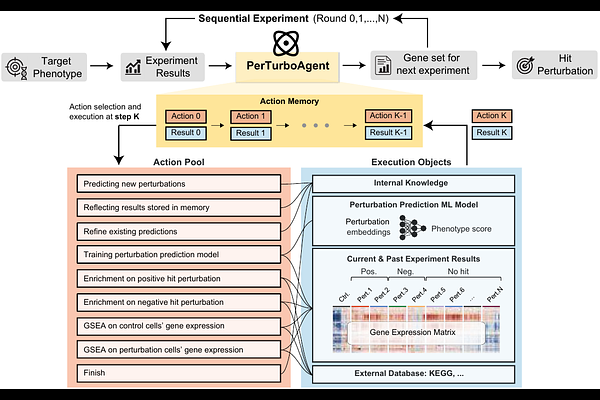PerTurboAgent: A Self-Planning Agent for Boosting Sequential Perturb-seq Experiments

PerTurboAgent: A Self-Planning Agent for Boosting Sequential Perturb-seq Experiments
Hao, M.; Lee, Y.; Wang, H.; Scalia, G.; Regev, A.
AbstractUnderstanding how genetic interventions affect a phenotype is key to revealing causal gene regulatory mechanisms and finding novel drug targets. Pooled, high-content perturbation screening methods like Perturb-seq allow us to assess the impact of each of a large number of genetic interventions on a rich cellular profile of RNA or other features, facilitating such discoveries. However, the overall scale of perturbations, especially when considering combinations of genes for perturbation, cannot be tackled exhaustively in the lab. An alternative is to use an iterative design: By leveraging the modularity and sparsity of gene cir- cuits along with prior biological knowledge, we can predict the impact of unseen genetic perturbations on these profiles and group genes with similar effects into co-functional modules, followed by a new round of Perturb-Seq to test these pre- dictions and improve the overall performance of the model. These iterative cycles of experiment and prediction allow prioritizing genes for testing, maximizing the knowledge gleaned from fixed experimental resources, and opening the way to learn general predictive models. Designing these experiments requires a system that can analyze a cellular system, incorporate new and existing knowledge, use statistical tools, predict the effects of unseen perturbations, and prioritize the set of perturbations for the next iteration. These can be time-consuming tasks for scientists and require multiple different skills. Here, we developed PerTurboAgent, an LLM-based agent that excels in predicting candidate gene panels for iterative Perturb-Seq experiments through self-directed data analysis and knowledge retrieval. We evaluated PerTurboAgent based on its ability to identify genes with a phenotypic impact on gene expression upon perturbation in genome-scale perturbation data. PerTurboAgent outperforms existing agent-based and active learning strategies, offering an efficient and understandable approach to designing sequential perturbation experiments